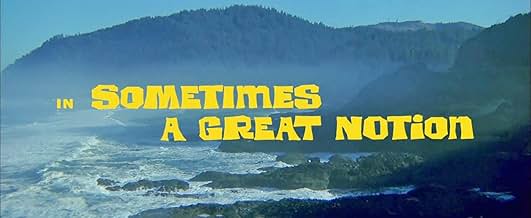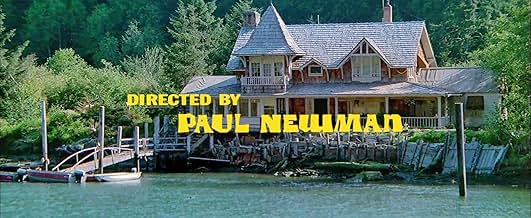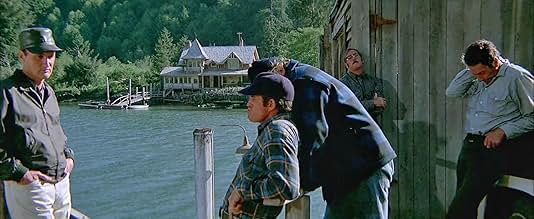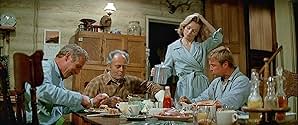AVALIAÇÃO DA IMDb
6,9/10
4,8 mil
SUA AVALIAÇÃO
Uma família de madeireiros independentes do Oregon luta para manter seu negócio familiar vivo em tempos de mudança.Uma família de madeireiros independentes do Oregon luta para manter seu negócio familiar vivo em tempos de mudança.Uma família de madeireiros independentes do Oregon luta para manter seu negócio familiar vivo em tempos de mudança.
- Direção
- Roteiristas
- Artistas
- Indicado a 2 Oscars
- 2 indicações no total
- Direção
- Roteiristas
- Elenco e equipe completos
- Produção, bilheteria e muito mais no IMDbPro
Avaliações em destaque
This is one of my favorite movies. It has excellent acting, a great story (by the late great Ken Kesey), and some very intense scenes. I found that Paul Newman's direction was very well done. This is a movie for fans of great character development.
First, Paul Newman, as usual, did an outstanding job. This is my favorite character. He was able to pull off this very icey dominance, even over his own father. He plays his character like he is Hank Stamper. Paul Newman always does a great job in his movies, but I think this one I especially like because he isn't as likeable as Cool Hand Luke or Fast Eddie (which are two other favorite characters and movies of mine).
Then there is Henry Fonda, who plays the eldest Stamper, Henry. He was a very interesting character, and Henry Fonda did a great job at playing him. He and Hank both head the family, and he and Paul Newman have a fractured relationship that is sort of crass, but still fun to see them on-screen together.
Then there is Michael Sarrazin, who plays the outcast Leeland Stamper. He is probably the best character. While all the other Stampers have leather skin and huge scars from wood chips, he has big bushy hair and is not a big barrel chested logger. Hank and Henry treat him like crap almost the whole movie, because he doesn't belong. Leeland just came back from the city, and he came back for the sole purpose of getting even with Hank.
And Finally, there is Lee Remick, who plays Hank's shut out wife Viv. She is probably the most complex character, simply because she only lets on what she thinks of her situation in little bits. She and Hank used to be wild lovers, but Hank is working so hard because of the logger's strike, he pretty much shuts her out, and so she begins to drift away from Hank.
My only problem with this movie is that they didn't have the big rights of passage fight between Hank and Leeland. In the book Leeland fought Hank after everything bad happened to the Stampers, as a way to show Hank that he isn't in control. I think that was the biggest part in the novel, and they left it out. But aside from that, I loved this movie.
Check this movie, or the book out for that matter, if you enjoy strong character development, many tragic events, and stories that take place in the backwoods of Oregon. 9/10
First, Paul Newman, as usual, did an outstanding job. This is my favorite character. He was able to pull off this very icey dominance, even over his own father. He plays his character like he is Hank Stamper. Paul Newman always does a great job in his movies, but I think this one I especially like because he isn't as likeable as Cool Hand Luke or Fast Eddie (which are two other favorite characters and movies of mine).
Then there is Henry Fonda, who plays the eldest Stamper, Henry. He was a very interesting character, and Henry Fonda did a great job at playing him. He and Hank both head the family, and he and Paul Newman have a fractured relationship that is sort of crass, but still fun to see them on-screen together.
Then there is Michael Sarrazin, who plays the outcast Leeland Stamper. He is probably the best character. While all the other Stampers have leather skin and huge scars from wood chips, he has big bushy hair and is not a big barrel chested logger. Hank and Henry treat him like crap almost the whole movie, because he doesn't belong. Leeland just came back from the city, and he came back for the sole purpose of getting even with Hank.
And Finally, there is Lee Remick, who plays Hank's shut out wife Viv. She is probably the most complex character, simply because she only lets on what she thinks of her situation in little bits. She and Hank used to be wild lovers, but Hank is working so hard because of the logger's strike, he pretty much shuts her out, and so she begins to drift away from Hank.
My only problem with this movie is that they didn't have the big rights of passage fight between Hank and Leeland. In the book Leeland fought Hank after everything bad happened to the Stampers, as a way to show Hank that he isn't in control. I think that was the biggest part in the novel, and they left it out. But aside from that, I loved this movie.
Check this movie, or the book out for that matter, if you enjoy strong character development, many tragic events, and stories that take place in the backwoods of Oregon. 9/10
Definitely an old school movie where the drama is tied up in day to day living. No great examinations just a family trying to go about their own business and the impacts that their choices have on themselves and their community.
Fonda is great and Newman just looks like he has been logging his entire life, super convincing.
The conflicts within the family are frequent but they never allow them to go too far, family is family.
It won't knock your socks off but its a nice film :)
Fonda is great and Newman just looks like he has been logging his entire life, super convincing.
The conflicts within the family are frequent but they never allow them to go too far, family is family.
It won't knock your socks off but its a nice film :)
Kesey's superb epic novel with its shifting points of view and verb tense is far too complex a work to adapt directly. Kesey's prose while exceptionally cinematic in its description and action ironically proves unfilmable.
That said, Paul Newman and his production team have created a most admirable and solid, if rather top heavy adaption of Kesey's excellent novel.
The dialogue while rather shallow and weak in spurts (Kesey's rich vernacular is lost)is overcome by a wonderful ensemble cast featuring some of America's finest. Who better that Henry Fonda to play Newman's father? Richard Jaekel richly earns the Oscar nomination as the dim-witted but enthusiastic born again lumberjack Joe-Ben. The famous scene where Newman tries desperately to save Jaekel's character from drowning is heartbreakingly tragic and darkly comic. It is a marvelous example of direction.
Newman spent a great deal of time in my native Oregon researching the part and the film and his homework shows. Kesey's rich descriptions of the land remain largely intact. The sense of time and place is impressively captured in the photography of rusting metal, dripping ferns, rotting wood and mildewed carpets. This is a film that one can almost smell.
Newman is one of the finest artists ever to come out of Hollywood. Not only as an actor, but also as a director. He instinctivly knows how to illicit naturalistic, comfortable and utterly human performances from his casts and Sometimes a Great Notion is no exception. Well worth a look. 7 out of 10 stars.
That said, Paul Newman and his production team have created a most admirable and solid, if rather top heavy adaption of Kesey's excellent novel.
The dialogue while rather shallow and weak in spurts (Kesey's rich vernacular is lost)is overcome by a wonderful ensemble cast featuring some of America's finest. Who better that Henry Fonda to play Newman's father? Richard Jaekel richly earns the Oscar nomination as the dim-witted but enthusiastic born again lumberjack Joe-Ben. The famous scene where Newman tries desperately to save Jaekel's character from drowning is heartbreakingly tragic and darkly comic. It is a marvelous example of direction.
Newman spent a great deal of time in my native Oregon researching the part and the film and his homework shows. Kesey's rich descriptions of the land remain largely intact. The sense of time and place is impressively captured in the photography of rusting metal, dripping ferns, rotting wood and mildewed carpets. This is a film that one can almost smell.
Newman is one of the finest artists ever to come out of Hollywood. Not only as an actor, but also as a director. He instinctivly knows how to illicit naturalistic, comfortable and utterly human performances from his casts and Sometimes a Great Notion is no exception. Well worth a look. 7 out of 10 stars.
I have read Kesey's novel several times over the last 30 years or so. While I see some merit in this movie version, I'd like to see someone have another go at it. The movie only captures the novel in broad strokes. It hits the major point (brother returns to hometown to exact revenge on older sibling), but misses a lot of the flavor. I think Paul Newman, Henry Fonda and Lee Remick were perfect, as were many of the supporting cast. But Michael Sarrazin didn't quite do it for me. Maybe it was the hair, idunno. I always pictured a sort of geeky-looking, bespectacled, beatnick-looking guy with scruffy hair, but still fairly short, and sideburns. Sarrazin probably could have pulled it off, but back in the early 70s, actors were into looking like people from the early 70s.
But more to the point, the movie needed more back-story. We needed to see Johah Stamper "heading west" with young Henry and his brother. We needed to see Jonah fail and surrender to the dampness of the Pacific Northwest and desert his family. We needed to see young Henry take charge ("we're gonna whup her") and begin the logging business that becomes the crux of the story. Also missed were a lot of great scenes when Henry and Leland were children (Henry rescuing Leland from the Devil's Stovepipe, for one). Also missed was the passing of narrative from character to character. One small portion of the novel is actually narrated by a dog. The novel is written, mostly, in the first person from various points of view. There is a little second person narrative at the beginning of most chapters that pull the reader out of the story to offer additional flavor for the surroundings. Obviously, a novel needs to be pared in order to fit into the standard movie length. It would have to be a rather long movie, three hours or so, to portray the texture presented in the novel. But I'd like to see another go at it, maybe even starring Paul Newman as Henry.
But more to the point, the movie needed more back-story. We needed to see Johah Stamper "heading west" with young Henry and his brother. We needed to see Jonah fail and surrender to the dampness of the Pacific Northwest and desert his family. We needed to see young Henry take charge ("we're gonna whup her") and begin the logging business that becomes the crux of the story. Also missed were a lot of great scenes when Henry and Leland were children (Henry rescuing Leland from the Devil's Stovepipe, for one). Also missed was the passing of narrative from character to character. One small portion of the novel is actually narrated by a dog. The novel is written, mostly, in the first person from various points of view. There is a little second person narrative at the beginning of most chapters that pull the reader out of the story to offer additional flavor for the surroundings. Obviously, a novel needs to be pared in order to fit into the standard movie length. It would have to be a rather long movie, three hours or so, to portray the texture presented in the novel. But I'd like to see another go at it, maybe even starring Paul Newman as Henry.
Unfortunately, as much as I love Paul Newman as an actor, the movie version of Ken Kesey's incredible book could have used a more seasoned director for its translation to the big screen. The perfect cast (the book even mentions Hank Stamper as looking like a muscular Paul Newman!), and some great performances (Fonda, Jaeckel, Remick), but the story just doesn't come across on film the way it should. I remember the first time I saw this movie was in the late 70's on TV (Portland's KPTV-12). It was so chopped-up for television that the story, character motivations, and ending made no sense at all to me. I loved Kesey's book "Cookoo's Nest" so read the novel of "Sometimes" to try to make some sense of what the story was all about. The book was an amazingly nuanced work of fiction with a great deal of depth and under-story (reading between the lines); none of which I saw on the TV screening. I later rented the video but even with the unedited version of the film, I found the story very lacking and barely comprehensive. I've recently watched the rental again (2005) and found more in the film than I had remembered, but I still feel that unless you've read the book, you can't truly understand what this movie and the character motivations are all about. They're just barely eluded to in the film version. In spite of all that, it's still a worthwhile movie to watch. If nothing else, it chronicles some great, authentic-looking logging footage. If you can, however, read the novel first and then catch the film. Also, if you ever make it to Newport, Oregon, visit the harbor bar "Bay Haven" where the scenes for the "Snag" were filmed. Tell them the old bartender from the "Embarcadero" sent you. ;-)
Você sabia?
- CuriosidadesThis was the first film ever shown on HBO when the service premiered in 1972.
- Erros de gravaçãoIn the fox-hunt scene, when the fox jumps over the fence, it becomes apparent that the fox is wearing a 1/4" black collar with a little tiny bell on it.
- Citações
Hank Stamper: [singing] Don't ever hit your mother with a shovel. It will leave a dull impression on her mind. Paul Newman said the same line in "Butch Cassidy and the Sundance Kid".
- Versões alternativasIn the earliest video release version, circa 1982, when Leland first arrives, a crane shot reveals Hank looking down below at the family reunion. In the most current VHS release, circa 1994, the crane shot is edited out and replaced with just a single cut from Viv, with an audio bridge to Hank on the roof.
- ConexõesFeatured in AFI Life Achievement Award: A Tribute to Henry Fonda (1978)
- Trilhas sonorasAll His Children
Lyrics by Marilyn Bergman and Alan Bergman
Music by Henry Mancini
Sung by Charley Pride
Principais escolhas
Faça login para avaliar e ver a lista de recomendações personalizadas
- How long is Sometimes a Great Notion?Fornecido pela Alexa
Detalhes
- Data de lançamento
- País de origem
- Idioma
- Também conhecido como
- Sometimes a Great Notion
- Locações de filme
- Empresas de produção
- Consulte mais créditos da empresa na IMDbPro
Bilheteria
- Orçamento
- US$ 3.660.000 (estimativa)
- Tempo de duração
- 1 h 54 min(114 min)
- Proporção
- 2.35 : 1
Contribua para esta página
Sugerir uma alteração ou adicionar conteúdo ausente




































